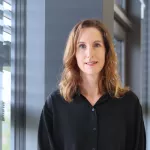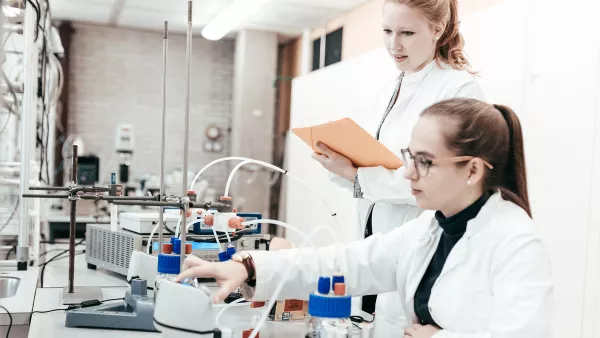At a glance
Dates
All events
Feature
The program is offered in cooperation with the Konstanz University of Applied Sciences (HTWG) and provides a broad-based study program at a high level. Students benefit from the differentiated orientation of the two universities involved. While the main focus of the Ravensburg-Weingarten University of Applied Sciences is rather on the fields of energy technology and environmental analysis, the HTWG Konstanz is specialized in the fields of apparatus, plants, mechanical and thermal process engineering.
Particular emphasis is placed on adapting the course offerings to the needs of practice. Students can apply and consolidate their acquired knowledge in laboratory practicals, in project work and during the master's thesis.
In terms of profile, the program is strongly application-oriented and meets with great interest from industry due to its broad orientation (process engineering, apparatus and plant engineering, analytics, energy systems engineering).
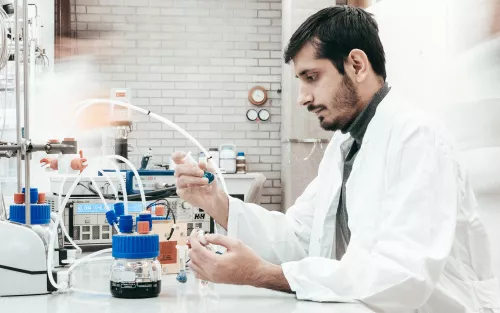
Study & study contents
The curriculum of the 3-semester Master's program is modular. In the first two semesters, 9 compulsory modules must be completed, plus two of four elective modules. In the 3rd semester, the written master's thesis is completed, for which 30 ECTS points are awarded.
In almost all modules, students acquire technical competence and thus deepen their environmental and process engineering knowledge.
In connection with the broadly based technical education, students acquire important methodological and key competencies for their later professional life, especially in the practical study phases (internships, project work, master's thesis).
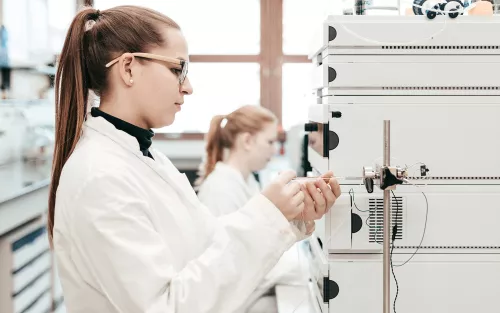
Profession & Perspectives
According to the unanimous forecast of the major associations VDI/GVC, DECHEMA and VDMA, the demand for engineers in the field of environmental and process engineering will increase. Graduates of the master's degree program in environmental and process engineering have access to the entire industrial sector of the chemical industry, pharmaceuticals, the food industry, plant and equipment construction, and even energy technology, biotechnology and medical technology. Jobs are also offered by public and private environmental and analytical laboratories, as well as the civil service and engineering offices.
Downloads
- Alle Infos kompakt auf einen Blick.
- §33 der Studien- und Prüfungsordnung für die Masterstudiengänge - Fassung vom 20. Oktober 2022
- Ältere Modulhandbücher sind im QM Portal abgelegt.
- Studien- und Prüfungsordnung für die Masterstudiengänge mit Allgemeinem Teil - Diese Änderungssatzung tritt zum SoSe 2023 in Kraft
- Satzung der Hochschule Ravensburg-Weingarten über die Regelungen zum Hochschulzulassungs- und –auswahlverfahren für Masterstudiengänge vom 3. April 2025
Further information
Admission
Application for the summer and winter semester
The Master's degree program in Environmental and Process Engineering is offered in cooperation with the University of Applied Sciences Konstanz (HTWG) and offers
- study places in Weingarten and Konstanz in the winter and summer semesters
- July 15: Application deadline for the winter semester
- January 15: Application deadline for the summer semester
These dates are cut-off dates, which means that your application documents must be received by this date in order to be considered for the allocation of study places.
Start of lectures
- Beginning of October for the winter semester
- mid-March for the summer semester
the exact date can be found in the menu item Dates.
to the online application
Who gets a study place?
Prerequisite for admission is a Bachelor's degree or another at least equivalent university degree in a technical or scientific field with an overall grade of at least 2.9.
Bachelor degree with 180ECTS
The Master's degree can only be awarded if 300 ECTS points have been achieved, including the previous degree. For applicants with a Bachelor's degree with 180ECTS, the head of the study program can define an appropriate preliminary semester in consultation with the applicant.
Further information on the application and the allocation of study places can be found in the Admissions Office.
SEMESTER FEE
Each semester, a semester fee is due for all students upon enrollment or re-registration. This fee is charged at a similar rate by all universities in Germany.
Composition and amount of the fee
FEES FOR INTERNATIONAL STUDENTS AND FOR SECOND DEGREE PROGRAMS
In Baden-Württemberg, there has been a tuition fee for international students (non-EU citizens) and a second-study fee since the winter semester 2017/2018. Thus, in some cases, a tuition fee must be paid in addition to the semester fee.
Prior to enrollment, applicants from non-EU countries or applicants for a second degree will receive a form to assess whether a tuition fee obligation actually exists.
The amounts and detailed information can be found under Finances
Labs
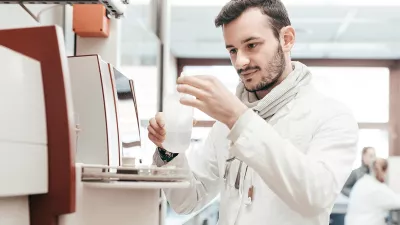
Chemistry and environmental analysis
- Building N (Natural Science Centre)
- Room N 246, N 018
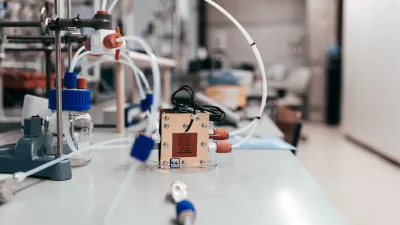
Electrochemical energy and process engineering
- Building N (Natural Science Centre)
- Room N 149
Contact & People
Dean of Studies & Academic Advising

Secretariat
Professors

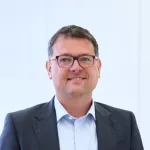
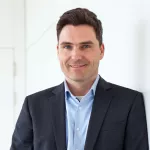
Academic staff
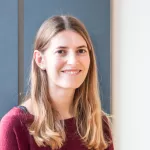
Admission Office
